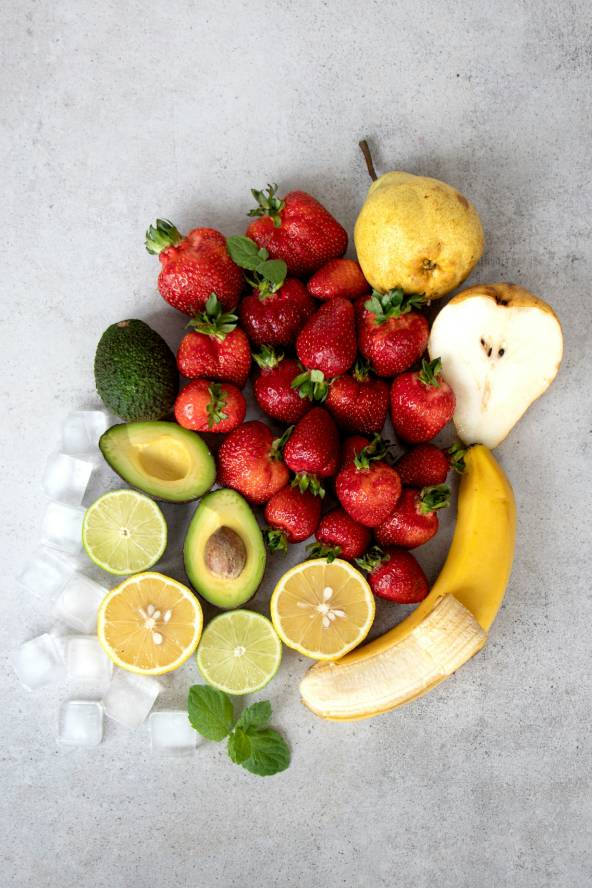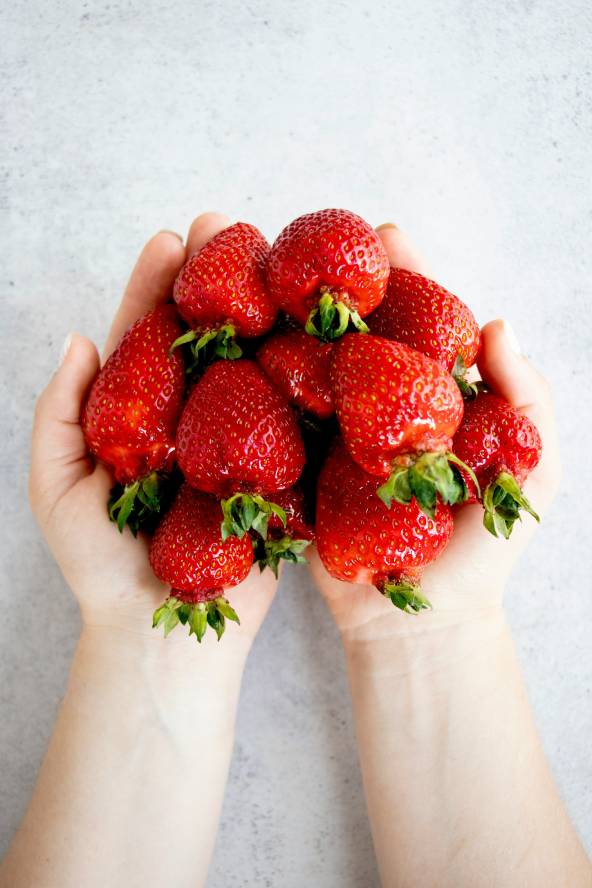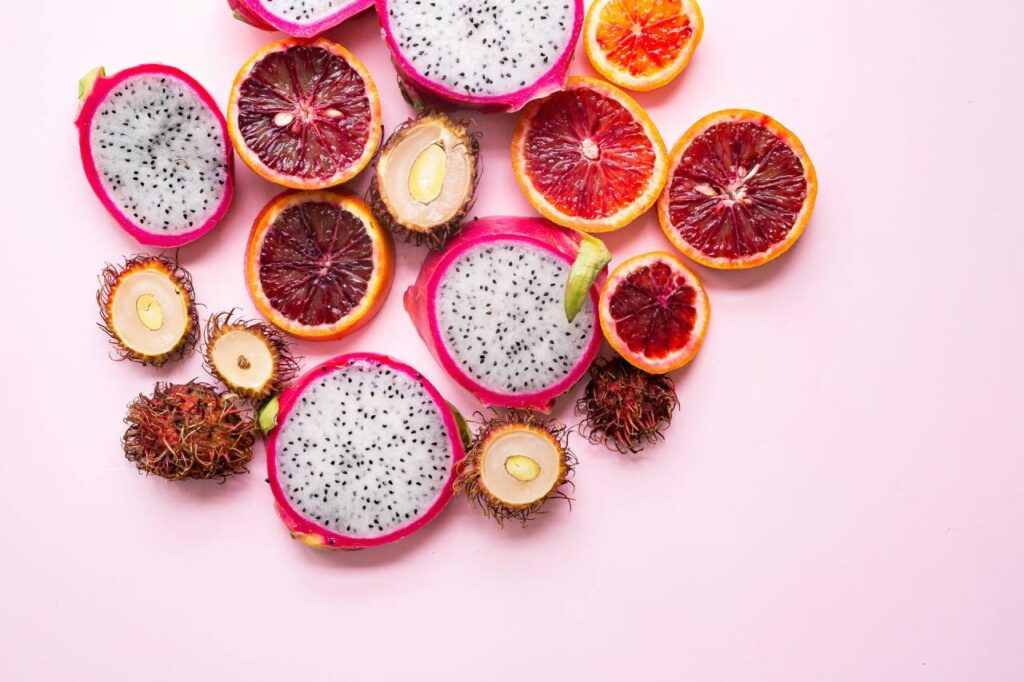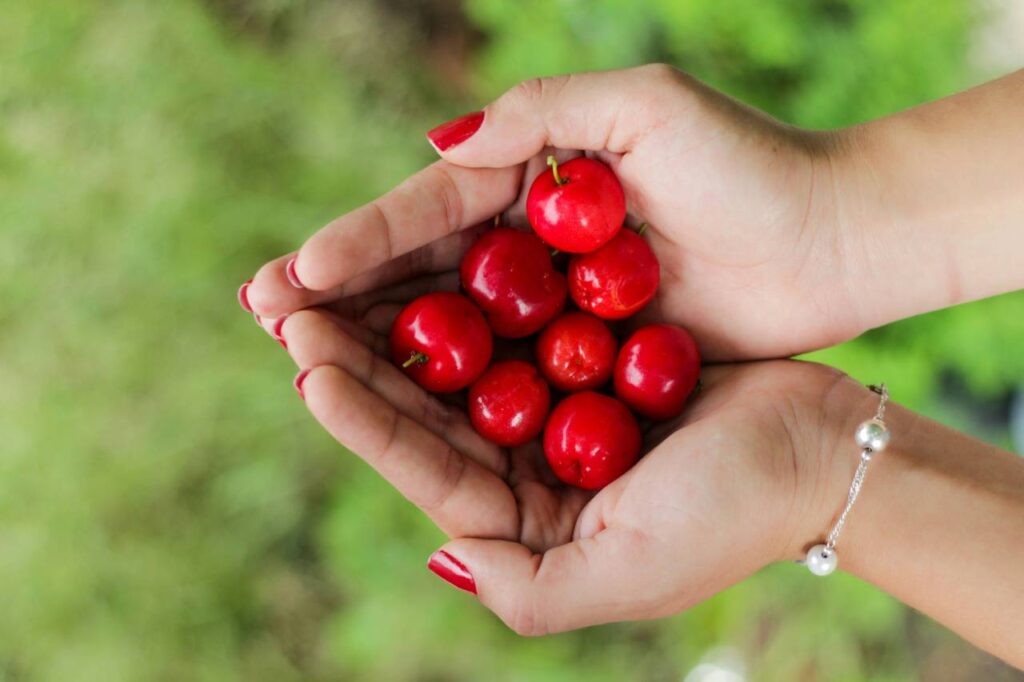Summer Season Fruits are very beneficial to eat to keep hydrated. In summer, nature treats us to a vibrant palette of delicious and nutritious fruits. Packed with vitamins, minerals, and refreshing flavors. These fruits not only help beat the heat but also boost our health in many ways.

Here’s a juicy list of the top 50 healthy summer season fruits:
1. Watermelon:
Known for its hydrating properties, watermelon is a must-have for hot summer days.
2. Strawberries
These little red gems are rich in antioxidants and Vitamin C, perfect for snacking or adding to salads.

3. Mangoes
Sweet, juicy, and oh-so-delicious, mangoes are a summer favorite packed with Vitamin A and fiber.
4. Pineapple
Tropical and tangy, pineapples are loaded with Vitamin C and bromelain, an enzyme with anti-inflammatory properties.
5. Blueberries
Tiny but mighty, blueberries are bursting with antioxidants and great for topping off your morning yogurt.
6. Cherries
Not just a tasty treat, cherries are also rich in antioxidants and can help with sleep.
7. Peaches
Juicy and fragrant, peaches are packed with Vitamin C and are a great addition to desserts or salads.
8. Kiwi
This fuzzy fruit is loaded with Vitamin C, fiber, and potassium, perfect for a refreshing snack.
9. Cantaloupe
Sweet and juicy, cantaloupes are rich in Vitamin A and a delicious way to stay hydrated.
10. Raspberries
These delicate berries are high in fiber and antioxidants, perfect for snacking or baking.
11. Apricots
A good source of Vitamin A and fiber, apricots are a sweet and nutritious summer treat.
12. Plums
Plums are low in calories but high in antioxidants, making them a great option for a guilt-free snack.
13. Blackberries
Packed with Vitamin C and fiber, blackberries are a delicious addition to smoothies or salads.
14. Papaya
This tropical fruit is rich in Vitamin C and digestive enzymes, promoting good gut health.
15. Nectarines
Similar to peaches but without the fuzz, nectarines are a sweet and juicy summer delight.
16. Grapefruit
Refreshing and tangy, grapefruits are packed with Vitamin C and can aid in weight loss.
17. Oranges
A classic summer fruit, oranges are loaded with Vitamin C and great for juicing or snacking.

18. Pears
Sweet and crisp, pears are high in fiber and make a refreshing addition to salads.
19. Guava
This tropical fruit is rich in fiber, Vitamin C, and antioxidants, perfect for a healthy snack.
20. Lychee
Sweet and floral, lychees are rich in Vitamin C and make a unique summer treat.
21. Figs
Figs are a good source of fiber and potassium, perfect for snacking or adding to desserts.
22. Cranberries
Known for their urinary tract health benefits, cranberries are tart and packed with antioxidants.
23. Mangosteen
This exotic fruit is rich in antioxidants and has anti-inflammatory properties.
24. Starfruit
With a unique shape and flavor, starfruit is high in Vitamin C and fiber.
25. Passion Fruit
Tangy and tropical, passion fruit is rich in antioxidants and fiber.
26. Kiwano (Horned Melon)
A striking fruit with a jelly-like interior, kiwano is rich in Vitamin C and potassium.
27. Tangerines
Sweet and easy to peel, tangerines are packed with Vitamin C and make a convenient snack.
28. Dragon Fruit
Exotic and colorful, dragon fruit is high in fiber and antioxidants.

29. Pomegranate
Pomegranates are packed with antioxidants and have anti-inflammatory properties.
30. Mulberries
These sweet berries are rich in Vitamin C and iron.
31. Gooseberries
Tart and tangy, gooseberries are high in Vitamin C and fiber.
32. Currants
Currants are packed with antioxidants and make a delicious addition to baked goods.
33. Persimmons
Sweet and flavorful, persimmons are rich in Vitamin A and fiber.
34. Tamarind
Known for its tangy flavor, tamarind is rich in Vitamin C and antioxidants.
35. Jackfruit
A tropical giant, jackfruit is high in fiber and Vitamin C.
36. Soursop
Creamy and tropical, soursop is rich in Vitamin C and antioxidants.
37. Ackee
A Jamaican favorite, ackee is rich in Vitamin C and potassium.
38. Longan
Similar to lychee, longan is sweet and rich in antioxidants.
39. Buddha’s Hand
A fragrant citrus fruit, Buddha’s Hand is rich in Vitamin C and adds a unique flavor to dishes.
40. Kumquat
Tiny and tart, kumquats are packed with Vitamin C and make a zesty snack.
41. Ugli Fruit
A cross between grapefruit, orange, and tangerine, ugli fruit is rich in Vitamin C and fiber.
42. Pepino Melon
Also known as “sweet cucumber,” pepino melon is refreshing and high in Vitamin C.
43. Sapodilla
Sweet and caramel-like, sapodilla is rich in fiber and antioxidants.
44. Feijoa
Also known as pineapple guava, feijoa is rich in Vitamin C and fiber.
45. Physalis (Ground Cherries)
These sweet and tart berries are packed with antioxidants and Vitamin C.
46. Jabuticaba
A Brazilian delicacy, jabuticaba is rich in antioxidants and has a unique grape-like flavor.
47. Loquat
Sweet and juicy, loquats are rich in Vitamin A and fiber.
48. Cherimoya
Creamy and tropical, cherimoya is rich in Vitamin C and fiber.
49. Pomelo
Giant and citrusy, pomelo is packed with Vitamin C and antioxidants.
50. Açaí Berry
Last but not least, açaí berries are rich in antioxidants and make a delicious addition to smoothie bowls.
There you have it—50 amazing summer season fruits to enjoy for a healthy and delicious season ahead! Whether you snack on them fresh, blend them into smoothies, or use them in desserts, these fruits will surely add a burst of flavor and nutrition to your summer days. So, grab a juicy slice, take a refreshing bite, and let these fruits brighten up your summer!
Advantages to Eat Healthy Summer Season Fruits:
As the temperature rises and the sun shines brighter, it’s the perfect time to indulge in nature’s delicious bounty: summer fruits! From juicy watermelons to tangy mangoes, the advantages of eating these seasonal delights go far beyond their delightful taste. Let’s explore the top reasons why adding these fruits to your diet can be a refreshing and healthy choice this summer.

1. Nourishment Packed with Flavor
Summer fruits are not just tasty treats; they are powerhouses of essential nutrients. Take watermelons, for example. These vibrant fruits are not only incredibly hydrating, thanks to their high water content, but they also boast a rich dose of vitamins A and C. Mangoes, on the other hand, are bursting with antioxidants like zeaxanthin and beta-carotene, crucial for eye health. By incorporating these fruits into your meals, you’re not just adding flavor, but a myriad of nutrients that support overall well-being.
2. Stay Hydrated, Stay Healthy
During the scorching heat of summer, staying hydrated is key, and what better way to do it than with hydrating fruits? Fruits like strawberries, cucumbers, and peaches have high water content, helping you beat the heat while keeping your body hydrated. This natural hydration also aids in digestion, supports glowing skin, and boosts energy levels, making it a win-win for your health.
3. Weight Management Made Delicious
If you’re aiming to maintain a healthy weight, summer fruits are your best friends. Unlike sugary snacks and desserts, these fruits are naturally sweet, satisfying your sweet tooth without the guilt. Plus, their fiber content helps you feel full longer, curbing unnecessary snacking and aiding in weight management efforts. So, swap that ice cream for a bowl of mixed berries, or enjoy a refreshing fruit salad for dessert!
4. Boost Your Immune System
Citrus fruits like oranges, lemons, and grapefruits are not just zesty and refreshing; they’re also packed with immune-boosting vitamins. Vitamin C, found abundantly in these fruits, is known for its role in strengthening the immune system and helping your body fight off infections and illnesses. So, load up on citrus this summer to keep those pesky colds at bay.
5. Support Local Farmers and Sustainable Practices
Eating seasonal fruits isn’t just good for your health; it’s also good for the environment. When you choose locally grown produce, you’re supporting farmers in your community and reducing the carbon footprint associated with transporting fruits over long distances. Additionally, seasonal fruits often require fewer pesticides and chemicals, promoting more sustainable farming practices.
6. Versatile and Fun to Eat
Let’s not forget the sheer joy of biting into a ripe, juicy peach or slurping on a slice of watermelon on a hot day. Summer fruits are incredibly versatile, whether you enjoy them on their own, blend them into smoothies, toss them into salads, or even grill them for a unique twist. Get creative in the kitchen and explore the many delicious ways to incorporate these fruits into your meals.
7. Mood-Boosting Goodness
Believe it or not, summer fruits can also uplift your mood! The natural sugars found in these fruits provide a quick energy boost, helping to combat fatigue and lift spirits. Additionally, the act of indulging in a delicious, healthy treat can bring about feelings of happiness and satisfaction, making your summer days even brighter.
With all these incredible benefits, there’s no reason not to dive into a colorful array of summer fruits this season. From supporting your health with essential nutrients to adding a burst of flavor to your meals, these fruits are nature’s way of making summer even sweeter. So, head to your local farmer’s market or grocery store, and let the fruity festivities begin! Your taste buds and body will thank you for it. Here’s to a happy, healthy, and delicious summer ahead!
Surprising Downsides of Eating Healthy Summer Fruits
Ah, the vibrant hues of summer fruits! From juicy watermelons to refreshing mangoes, the season brings forth a cornucopia of delicious and nutritious options. But hold on a second—could there be disadvantages to indulging in these summer treats? Let’s dive into the surprising downsides of eating healthy summer fruits.
1. High Sugar Content
While natural sugars in fruits are better than processed sugars, they can still add up quickly. Eating too much fruit, especially sweet ones like mangoes and pineapples, can lead to spikes in blood sugar levels. This can be problematic for those with diabetes or those trying to manage their sugar intake.
2. Acidity
Citrus fruits, such as oranges and grapefruits, are beloved for their tangy flavor. However, their acidic nature might not sit well with everyone. For those with sensitive stomachs or acid reflux issues, indulging in too many citrus fruits can lead to discomfort and heartburn.
3. Potential for Weight Gain
Yes, even healthy fruits can contribute to weight gain if consumed excessively. They are packed with natural sugars and can be quite calorie-dense. Overeating fruits without considering portion sizes might lead to consuming more calories than needed, which can thwart weight loss efforts.
4. Digestive Issues
While fruits are rich in fiber, which is excellent for digestion, too much of a good thing can sometimes cause digestive distress. Eating a large amount of fruits, especially those high in fiber like berries and apples, can lead to bloating, gas, and even diarrhea in some individuals.
5. Cost
During the summer, when these fruits are at their peak, they might be more affordable. However, if you’re looking for them out of season, the cost can skyrocket. Fresh berries in the dead of winter can be quite the splurge, making it harder to stick to a budget-friendly healthy diet.
6. Potential Allergic Reactions
Some people may have allergies to specific fruits, such as kiwi, strawberries, or even certain types of melons. These allergies can range from mild itching to severe reactions requiring immediate medical attention. It’s essential to be aware of any potential allergies before diving into a fruit feast.
7. Pesticide Residue
While not a problem exclusive to summer fruits, it’s worth noting that conventionally grown fruits can harbor pesticide residues. Washing fruits thoroughly can help reduce exposure, but for those concerned about pesticides, opting for organic varieties might be a better choice.
8. Dental Health
The natural sugars in fruits can also pose a risk to dental health. Eating fruits high in sugar content, such as bananas and grapes, too frequently without proper oral hygiene can contribute to tooth decay and cavities.
9. Challenges with Storage
Summer fruits, especially the more delicate ones like berries and peaches, have a shorter shelf life. This means you need to consume them relatively quickly before they start to spoil. Improper storage can lead to wasted food and money.
10. Interference with Medications
Believe it or not, certain fruits can interact with medications. Grapefruit, for medications, including those for high blood pressure and cholesterol.
Surprising Downsides of Eating Healthy Summer Fruits
While these downsides might seem surprising, they don’t mean you should avoid summer fruits altogether. Moderation is key, as with all good things in life. Being mindful of portion sizes, balancing your fruit intake with other food groups, and choosing a variety of fruits can help you reap the benefits without falling prey to the potential disadvantages.
Frequently Asked Questions:
Q. What are summer season fruits?
A. Summer season fruits are fruits that are typically at their peak during the summer months. These fruits thrive in warm weather and are often known for their refreshing and juicy qualities.
Q. What are some examples of summer season fruits?
A. Some common examples of summer season fruits include watermelon, strawberries, cherries, peaches, plums, mangoes, grapes, and kiwi.
Q. Are summer season fruits good for health?
A. Yes, summer season fruits are not only delicious but also packed with vitamins, minerals, and antioxidants. They are great for hydration, digestion, and overall well-being.
Q. How can I tell if a summer fruit is ripe?
A. Each fruit has its signs of ripeness. For example, watermelons should sound hollow when tapped, strawberries should be bright red and fragrant, and peaches should yield slightly to gentle pressure near the stem.
Q. What are the benefits of eating summer season fruits?
A. Eating summer fruits can boost your immune system, improve skin health, aid in digestion, and provide a natural energy boost. Plus, they are a tasty way to stay hydrated during hot days.
Q. Can I freeze summer fruits for later use?
A. Yes, many summer fruits freeze well for later use in smoothies, desserts, or as toppings. Simply wash, dry, chop (if needed), and store in airtight containers or freezer bags.
Q. How should I incorporate summer fruits into my diet?
A. There are endless ways to enjoy summer fruits! You can eat them fresh as a snack, toss them into salads for a burst of flavor, blend them into refreshing smoothies, or even grill them for a sweet twist.
Q. Are there any precautions to take when consuming summer fruits?
A. Some fruits, like cherries and peaches, have pits that should be removed before eating. Additionally, if you have allergies, it’s important to be aware of any potential reactions to certain fruits.
Q. What if I’m not sure how to choose the best summer fruits at the market?
A. When selecting summer fruits, look for vibrant colors, a sweet aroma (for fruits like peaches and berries), and avoid any with bruises or soft spots. Don’t hesitate to ask the vendor for advice!
Q. Are there any lesser-known summer fruits I should try?
A. Absolutely! Consider exploring fruits like lychee, passion fruit, papaya, or guava. These exotic options can introduce you to new flavors and expand your summer fruit repertoire.
Remember, enjoying a variety of summer season fruits not only delights your taste buds but also contributes to a healthy and balanced diet.
Q. What are some popular summer fruits that are also healthy?
A. Some popular and healthy summer fruits include watermelon, strawberries, mangoes, pineapples, peaches, cherries, and plums. These fruits are not only delicious but also packed with vitamins, minerals, and antioxidants.
Q. How can I incorporate summer fruits into my diet?
A. There are many ways to enjoy summer fruits! You can eat them fresh as a snack, add them to salads for a refreshing twist, blend them into smoothies, make fruit salads, or even freeze them for a cool treat.
Q. Are summer fruits good for hydration?
A. Yes, many summer fruits have high water content, making them excellent choices for staying hydrated during hot weather. Watermelon, for example, is about 92% water, while strawberries and peaches also have high water content.
Q. Which summer fruits are low in calories?
A. Fruits like strawberries, watermelon, cantaloupe, and peaches are low in calories but high in vitamins and minerals. They make perfect snacks for those looking to manage their calorie intake while staying healthy.
Q. What are the health benefits of eating summer fruits?
A. Summer fruits offer a wide range of health benefits. They are rich in vitamins C and A, which support a healthy immune system and promote good vision. They also provide fiber for digestive health and antioxidants that help protect cells from damage.
Q. Can I freeze summer fruits to enjoy them later?
A. Yes, many summer fruits can be frozen to preserve them for later use. Berries, such as strawberries, blueberries, and raspberries, freeze particularly well. Simply wash, dry, and freeze them on a baking sheet before transferring to a freezer bag.
Q. Are there any summer fruits that are good for skin health?
A. Yes, several summer fruits can contribute to healthy, glowing skin. Mangoes, for instance, are rich in vitamins A and C, which promote collagen production and protect against skin damage. Berries are also great for skin health due to their antioxidants.
Q. How can I tell if a summer fruit is ripe and ready to eat?
A. Each fruit has its signs of ripeness. For example, watermelons should sound hollow when tapped, while ripe mangoes give slightly gentle pressure. Strawberries should be bright red with no white shoulders, and peaches should have a slight give when pressed near the stem.
Q. Are there any summer fruits that are particularly good for weight loss?
A. Fruits like berries, watermelon, and peaches are low in calories and high in fiber, making them excellent choices for weight loss. They help keep you full while providing essential nutrients.
Q. Can I overeat fruit during the summer?
A. While fruits are healthy, it’s still possible to consume too much of a good thing. Fruits contain natural sugars, so if you’re watching your sugar intake or have specific dietary needs, it’s essential to moderate your consumption. Balancing fruits with a variety of other nutrient-dense foods is key to a healthy diet.
So, as you savor those sweet summer strawberries or indulge in a slice of juicy watermelon, just remember to enjoy them in moderation and listen to what your body tells you. Summer season fruits can be a delightful addition to a healthy diet, as long as you keep these potential pitfalls in mind. Stay healthy, stay balanced, and enjoy the best of what each season has to offer.











